Book 3 Unit1高一英语人教版新课标必修三复习 导学案和答案
高一英语必修3第1单元导学案
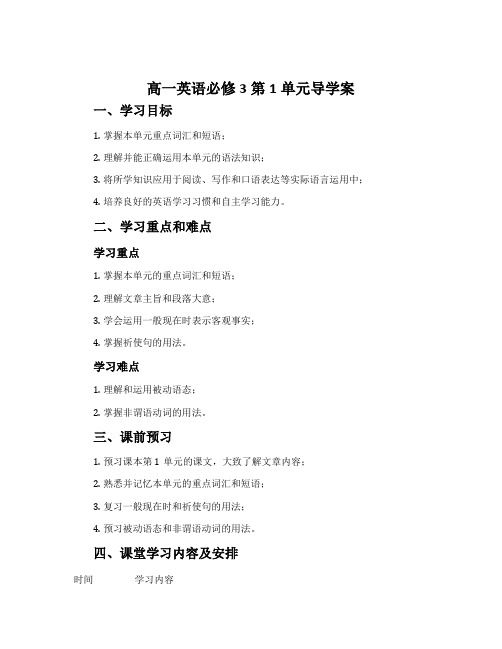
高一英语必修3第1单元导学案
一、学习目标
1.掌握本单元重点词汇和短语;
2.理解并能正确运用本单元的语法知识;
3.将所学知识应用于阅读、写作和口语表达等实际语言运用中;
4.培养良好的英语学习习惯和自主学习能力。
二、学习重点和难点
学习重点
1.掌握本单元的重点词汇和短语;
2.理解文章主旨和段落大意;
3.学会运用一般现在时表示客观事实;
4.掌握祈使句的用法。
学习难点
1.理解和运用被动语态;
2.掌握非谓语动词的用法。
三、课前预习
1.预习课本第1单元的课文,大致了解文章内容;
2.熟悉并记忆本单元的重点词汇和短语;
3.复习一般现在时和祈使句的用法;
4.预习被动语态和非谓语动词的用法。
四、课堂学习内容及安排
时间学习内容
10:00-10:20 复习本单元的重点词汇和短语
10:20-10:40 理解文章主旨和段落大意
10:40-11:00 运用一般现在时表示客观事实
11:00-11:20 掌握祈使句的用法
11:20-11:50 学习被动语态的用法
11:50-12:20 掌握非谓语动词的用法
五、课后练习和作业
1.完成课后练习题;
2.阅读课外读物,总结文中的重点词汇和短语,并写一篇读后感。
六、学习反思
1.总结本节课学到的重点知识;
2.将所学知识与实际运用结合,思考如何提高语言表达的准确性和流利度;
3.对自己的学习方法进行反思和调整,如何更有效地掌握英语知识。
book 3 unit 3 复习导学案(有答案)-教学文档

教师范读的是阅读教学中不可缺少的部分,我常采用范读,让幼儿学习、模仿。如领读,我读一句,让幼儿读一句,边读边记;第二通读,我大声读,我大声读,幼儿小声读,边学边仿;第三赏读,我借用录好配朗读磁带,一边放录音,一边幼儿反复倾听,在反复倾听中体验、品味。3.Have passion and enjoy learning English.
要练说,得练看。看与说是统一的,看不准就难以说得好。练看,就是训练幼儿的观察能力,扩大幼儿的认知范围,让幼儿在观察事物、观察生活、观察自然的活动中,积累词汇、理解词义、发展语言。在运用观察法组织活动时,我着眼观察于观察对象的选择,着力于观察过程的指导,着重于幼儿观察能力和语言表达能力的提高。1.To consolidate the words, phrases and sentences of Unit 3 and improve the ability to use them.
15.n.耐性;忍耐→adj.&n.有耐心的;病人
16.adj.难以置信的→v.相信;信任
n.信念;信仰
Ⅱ. Phrases
1.抚养;培养;教育;提出
2.前进;(用于祈使句)可以;往下说
Book3Unit3导学案答案(分页发)
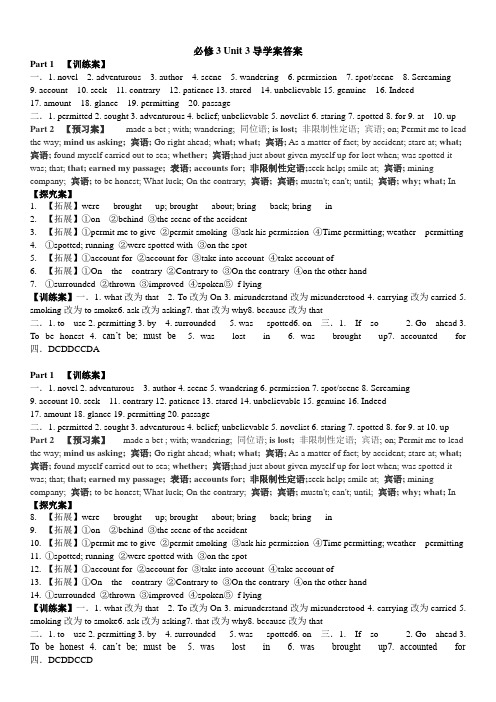
必修3 Unit 3导学案答案Part 1 【训练案】一.1. novel 2. adventurous 3. author 4. scene 5. wandering 6. permission 7. spot/scene 8. Screaming 9. account 10. seek 11. contrary 12. patience 13. stared 14. unbelievable 15. genuine 16. Indeed17. amount 18. glance 19. permitting 20. passage二.1. permitted 2. sought 3. adventurous 4. belief; unbelievable 5. novelist 6. staring 7. spotted 8. for 9. at 10. up Part 2 【预习案】made a bet ; with; wandering; 同位语; is lost;非限制性定语; 宾语; on; Permit me to lead the way; mind us asking; 宾语; Go right ahead; what; what; 宾语; As a matter of fact; by accident; stare at; what; 宾语; found myself carried out to sea; whether; 宾语;had just about given myself up for lost when; was spotted it was; that; that; earned my passage; 表语; accounts for; 非限制性定语;seek help; smile at;宾语; mining company;宾语; to be honest; What luck; On the contrary;宾语; 宾语; mustn't; can't; until;宾语; why;what; In 【探究案】1.【拓展】were brought up; brought about; bring back; bring in2.【拓展】①on ②behind ③the scene of the accident3.【拓展】①permit me to give ②permit smoking ③ask his permission ④Time permitting; weather permitting4.①spotted; running ②were spotted with ③on the spot5.【拓展】①account for ②account for ③take into account ④take account of6.【拓展】①On the contrary ②Contrary to ③On the contrary ④on the other hand7.①surrounded ②thrown ③improved ④spoken⑤f lying【训练案】一.1. what改为that 2. To改为On 3. misunderstand改为misunderstood 4. carrying改为carried 5. smoking改为to smoke6. ask改为asking7. that改为why8. because改为that二.1. to use 2. permitting 3. by 4. surrounded 5. was spotted6. on 三.1. If so 2. Go ahead 3. To be honest 4. can’t be; must be 5. was lost in 6. was brought up7. accounted for 四.DCDDCCDAPart 1 【训练案】一.1. novel 2. adventurous 3. author 4. scene 5. wandering 6. permission 7. spot/scene 8. Screaming9. account 10. seek 11. contrary 12. patience 13. stared 14. unbelievable 15. genuine 16. Indeed17. amount 18. glance 19. permitting 20. passage二.1. permitted 2. sought 3. adventurous 4. belief; unbelievable 5. novelist 6. staring 7. spotted 8. for 9. at 10. up Part 2 【预习案】made a bet ; with; wandering; 同位语; is lost;非限制性定语; 宾语; on; Permit me to lead the way; mind us asking; 宾语; Go right ahead; what; what; 宾语; As a matter of fact; by accident; stare at; what; 宾语; found myself carried out to sea; whether; 宾语;had just about given myself up for lost when; was spotted it was; that; that; earned my passage; 表语; accounts for; 非限制性定语;seek help; smile at;宾语; mining company;宾语; to be honest; What luck; On the contrary;宾语; 宾语; mustn't; can't; until;宾语; why;what; In 【探究案】8.【拓展】were brought up; brought about; bring back; bring in9.【拓展】①on ②behind ③the scene of the accident10.【拓展】①permit me to give ②permit smoking ③ask his permission ④Time permitting; weather permitting11.①spotted; running ②were spotted with ③on the spot12.【拓展】①account for ②account for ③take into account ④take account of13.【拓展】①On the contrary ②Contrary to ③On the contrary ④on the other hand14.①surrounded ②thrown ③improved ④spoken⑤f lying【训练案】一.1. what改为that 2. To改为On 3. misunderstand改为misunderstood 4. carrying改为carried 5. smoking改为to smoke6. ask改为asking7. that改为why8. because改为that二.1. to use 2. permitting 3. by 4. surrounded 5. was spotted6. on 三.1. If so 2. Go ahead 3. To be honest 4. can’t be; must be 5. was lost in 6. was brought up7. accounted for 四.DCDDCCDPart 3【探究案】一、Object Clauses 宾语从句1.1) that, that ○1that ○2that ○3that, that, that 2) 练一练:1. if / whether 2. whether 3. if / whether 4. whether 5. whether 3) what when where who (whom) what time how often how long 2. 1) lives lived will come 2) lived was talking would come had seen 3) travels4. 4) it it it二、Predicative Clauses 表语从句whether as if that that【训练案】一、单项选择1-5: DABCC 6-11: DCBCDA二、用合适的连接词填空:1. what2. how3. what4. that5.why6.whether7.that8.where 9.which 10.what三、完成句子 1. whom she was talking with 2. what I have done 3. who could answer the question4. what we should do next5. if/whether it will be sunny tomorrow6. whether she would come or notPart4【探究案】1. 1)a large quantity of 2) plenty of 3) a great many2.1) having/getting a chance 2) take a chance3.1) in a very polite manner 2) bad manners4.1) in green 2) in uniform5.1) as for 2) As for【训练案】一、单句改错。
高一英语(必修3)Unit1第3课时导学案(标准版)

高一英语(必修3)Unit1第3课时导学案学习目标知识与技能:掌握课文中重点词、短语及句型的用法。
过程与方法:小组合作,共同探究。
情感态度价值观:了解一些世界各国的重要节日和风土人情。
教学重点重点词、短语及及句型的用法。
教学难点理解部分长、难句。
学法指导长、难句的分析。
学习过程自主探究——问题发现自我检测:阅读课文,分析并翻译下列长、难句1)at that time people would starve if food was difficult to find, especially during the cold winter months.(主语+be+adj.+to do sth.句式)此句中的to find是动词不定式的主动形式,但却表示被动意义。
该句使用的是“主语+be+adj.+to do sth.”结构,在该句型中不定式用主动形式表示被动意义。
如后面的动词时不及物动词,则要加上适当的介词或副词。
翻译:例句:① english is very difficult to learn well in a short time.翻译:② the author gradually realizes her mother’s body l anguage is_________________.作者逐渐地意识到她母亲的肢体语言很容易理解。
③ the sofa is very _____________________.这沙发坐上去很舒服。
④ it is said that the man _______________________.据说这个人很难相处。
2) some festivals are held to honor the dead or to satisfy the ancestors, who might return either to help or to do harm. (either…or…意为“或者…或者…”)翻译:[句式仿写] 约翰,你可以选择或者打篮球或者上网。
高一《英语》必修3 Unit 1 Vocabulary学案与答案

必修3 Unit 1 Vocabulary【学习目标】1.To memorize the word formation(词性转换);2.To know the usage of words and expressions.3.To use the key words and phrases in the real conditions.【学法指导】1.自主查字典找出正确的词形变化;2.以小组为单位,合作探究本节重点单词短语。
【预习案】PartⅠ词性转换速查1.hunter n. ______________v.2.celebration n. ___________ v.3.origin n. __________ adj.4.religious adj._________ n.5.belief n. ____________v.6.arrival n. ___________v.7.independence n. _____________ adj. 8.agriculture n. _______________adj.9.energetic adj. __________n.10.fool n./v. __________ adj.11.permission n. __________v.12.apologize v. ___________n.13.weep v. _________(p)_________(pp)14.forgive v. ________(p)_________(pp)PartⅡ短语速记1.celebration n. 庆祝;祝贺celebrate v.辨析: celebrate:后接物。
celebrate sth.congratulate:后接人。
congratulate sb. on (doing) sth. 祝贺某人某事congratulations (to sb.) on sth.2.in memory of纪念,追念in honor of为纪念,为向......表示敬意in search of 寻找in charge of sth.负责...... in the charge of sb.由......负责in favor of支持,赞同in need of需要3.belief n. 信任,信心,信念(复数为beliefs)beyond belief难以置信have belief in 信任...... believe v.相信believe in信任believe it or not信不信由你4.dress up 盛装,打扮,装饰She dressed up as a lawyer.拓展:dress sb./oneself 给某人(自己)穿衣服be dressed in+衣服、颜色:穿着......的衣服get dressed穿衣服5.have fun with sb. 与某人玩得开心It’s fun doing sth. What fun it is to play with snow!make fun of=laugh at=play a trick on=play jokes on 取笑,开玩笑6. permission n.许可,允许permit(permitted, permitting) v.允许ask for one’s permission征求某人的许可without permission未经许可permit/allow sb. to do=be permitted/allowed to do sth.permit/allow doing sth.7.keep one’s word 守信用,履行诺言break one’s word 失信in a word简而言之in other words换言之have a word with sb.与某人谈一谈have words with sb. about sth.因某事与某人争吵Word came that our team won.(消息,信息,不可数名词)8.apologize vi.道歉,辩白apology n.道歉apologize to sb. for (doing) sth.=make an apology to sb. for (doing) sth.9.set off①出发,动身set off for Australia②使爆炸Some boys are setting off fireworks in the street.几个男孩正在街上放烟花。
[学案]人教版高一英语必修3第三单元(Book 3) Unit 3学案含答案
![[学案]人教版高一英语必修3第三单元(Book 3) Unit 3学案含答案](https://img.taocdn.com/s3/m/6f256f5fddccda38376baf40.png)
Unit 3 The Million Pound Bank Note (Module 3) Period 1 Reading: The Million Pound Bank Note (Act I, Scene 3)Class : Name : Group : No : Learning Objectives :1. Learn the useful new words and expressions in the lesson.2. Read the story and learn about the skills of reading actor ’s lines in dramasLearning Key Points :1. Reading skills: scanning and skimming2. Get students to learn drama reading skills.Learning Difficult Points :Develop reading ability.Learning Procedures :I. 【Pre-class homework 】 A. Answer the questions and find out the supporting details.1. Where is Henry Adams from? Does he know much about London? __________________________________________________________2. What did he do in America?__________________________________________________________3. Why did he land in Britain?__________________________________________________________4.Why do the brothers make a bet?__________________________________________________________B. Read the play again and fill in the table.aC. Put the following events in correct order.( )① Henry wandered in London streets.( )② About a month ago, Henry Adams was sailing out of the bay. ( )③ The next morning he was spotted by a ship.( )④ Towards nightfall he found himself carried out to sea by a strong wind.( )⑤ On the ship he earned his passage by working as an unpaid hand.II.【While-class】Step1. Lead-in 展示点评Step2. Group discussionSs discuss their pre-class homework in groupStep3 Consolidation: Reading comprehension ArrayA. Choose the best answers.1. Henry landed in Britain________A. because he planned to earn a living thereB. because he lost his own shipC. by accidentD. because he wanted to wander in London2. What happened to Henry when he was sailing out of the bay?A. His boat sank in a storm at sea.B. He was carried out to sea by a strong wind.C. He was attacked by some bad men at sea.D. He jumped into the sea to kill himself.3. Which of the following words can best describe Henry?A. BraveB. HonestC. LazyD. Shy4. Which of the following is TRUE?A. Henry opened the letter before 2 o’clock.B .The two brothers would like to offer him a job.C. Roderick believed that with a million pound bank note a man could survive a month.D. Henry only wanted a job because he was penniless in London.5. How did Henry feel when the two brothers gave him the letter?A. UnhappyB. SurprisedC. PleasedD. ExcitedB. Blank fillingHenry Adams, an American businessman, was __ 1 out to sea by a strong wind in his own boat. He spent a hopeless night on the sea until the next morning. Luckily, he was ___2 ___ and saved by a ship. Then he ___ 3__ his passage by working for free on the board. After he __4__ in Britain, he went to the Ameican embassy for help, but without luck. One day, he was __5__ in the street when he was called into a large house owned by __ 6__ old businessmen, who asked him a few questions. Henry answered that he was looking for a __7__ in London and asked whether they could offer any. They didn ’t answer directly but gave Henry an ____8 ___ which they said contained a sum of ____ 9 ___ . They also asked Henry to promise not to __ 10_ it until 2 o ’clock. Henry thought it was silly but accepted it.Step4.PresentationStep5.SummaryIII.【Post-class 】 Self- reflectionKeys:I. Pre-class homeworkA.1. Henry comes from San F rancisco. No, he doesn’t know London at all. (L18--21)2. He worked for a mining company. (L40)3. He was sailing out the bay when he was carried out to sea by a strongwind and was survived by a ship for London. (L28--34)4. Because they want to know if a poor man can live with a millionpound note in a strange place. (L1--3)B. 1.sailing , 2.carried, 3. spotted, 4. London, 5.lost,6. called ,7. letter.C.②④③⑤①II. While-class (课堂教学流程)A.choose the best answers.CBBDABlank filling1.carried2.spotted3.earnednded5. wandering6. two7.job8.envelop9.money 10.openUnit 3 The Million Pound Bank Note(Module 3)Period 2 Language focus in Reading 1Class:Name:Group:No:Learning Objectives:1. Learn and grasp the important useful new words and expressions.2. Learn the important useful sentences and patterns.3. Make sentences after the useful expressions.Learning Key Points:Enable Ss to grasp the usages of such important new words and expressions.Learning Difficult Points:Get Ss to understand some difficult and long sentences.Learning Procedures:ArrayI.【Pre-class homework】A.Make sentences using the following works and phrases:1.permit2. seek3. spot4. bring up5. by accident6. account for7. on the contrary8. as forB. 句子仿写1.I wonder, Mr Adams, if you’d mind us asking a few questions.仿句:我不知道你是否介意我用下你的自行车?__________________________________________________________ 2. Well, towards nightfall I found myself carried out to sea by a strong wind.翻译:到黄昏时, 我发现自己____________________。
Book3Unit1导学案答案(分页发)

必修3 Unit 1导学案答案Part 1 【训练案】一.1. starve 2. poet 3. drown 4. permission 5. independence 6. awards 7. religious 8. belief 9. trick 10. gained 11. gathering 12. admired 13. celebration 14. apologized 15. obvious 16. prediction 17. sadness 18. forgave 19. wiped 20. agricultural二.1. meant 2. are beautifying 3. unbelievable 4. wept 5. independently 6. apologizes 7. seasonal 8. wove 9. necessarily 10. admiring 11. energetic 12. announcement 13. drowning 14. obviously 15. forgivenessPart 2 【探究案】1.meant-meant【例句】1) are meant to be 2) meant to attend 3) means waiting 4) are meant for you2.【拓展】take one’s place【词语辨析】take place; happen; break out【例句】1) will take place 2) has broken out 3) happened 4) take his place3.【例句】1) were starved to death 2) are starved for love4.【例句】1) in memory of 2) In memory of the famous scientists 3) are in favour of 4) in celebration of5.【例句】1) dressed her baby 2) dressed up as 3) dress up 4) dressed in red6.【例句】1) 今年最佳女演员奖颁给了赵薇。
最新人教版高中英语必修三导学案(全册_共5个单元_35页)
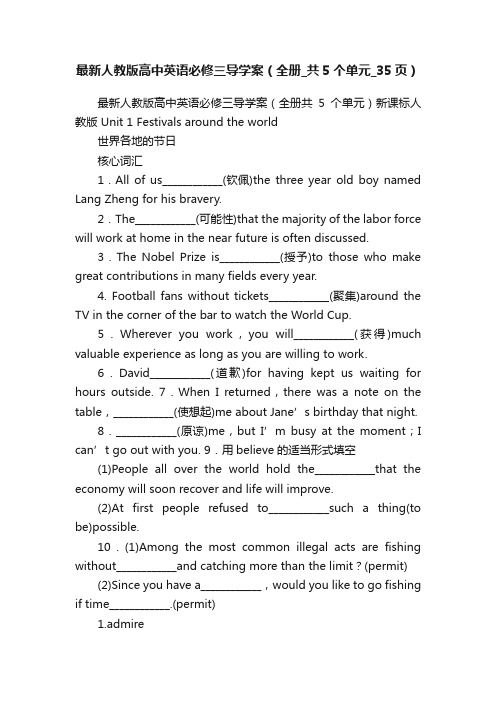
最新人教版高中英语必修三导学案(全册_共5个单元_35页)最新人教版高中英语必修三导学案(全册共5个单元)新课标人教版 Unit 1 Festivals around the world世界各地的节日核心词汇1.All of us____________(钦佩)the three year old boy named Lang Zheng for his bravery.2.The____________(可能性)that the majority of the labor force will work at home in the near future is often discussed.3.The Nobel Prize is____________(授予)to those who make great contributions in many fields every year.4. Football fans without tickets____________(聚集)around the TV in the corner of the bar to watch the World Cup.5.Wherever you work,you will____________(获得)much valuable experience as long as you are willing to work.6.David____________(道歉)for having kept us waiting for hours outside. 7.When I returned,there was a note on the table,____________(使想起)me about Jane’s birthday that night.8.____________(原谅)me,but I’m busy at the moment;I can’t go out with you. 9.用believe的适当形式填空(1)People all over the world hold the____________that the economy will soon recover and life will improve.(2)At first people refused to____________such a thing(to be)possible.10.(1)Among the most common illegal acts are fishing without____________and catching more than the limit?(permit)(2)Since you have a____________,would you like to go fishing if time____________.(permit)1.admire2.possibility3.awarded4.gathered5.gain6.apologized7.reminding8.Forgive9.(1)beliefssion (2)believe10.(1)permission (2)permit;permits高频短语1.________________ 发生2.________________ 纪念;追念3.________________ 盛装;打扮;装饰4.________________ 搞恶作剧;诈骗;开玩笑5.________________ 期望;期待;盼望6.________________ 日夜;昼夜;整天7.________________ 好像8.________________ 玩得开心9.________________ 出现;到场10.________________ 守信用;履行诺言11.________________ 屏息;屏气12.________________ 出发;动身;使爆炸13.________________ 使……想起……1.take place 2.in memory of 3.dress up 4.play a trick on 5.look forward to 6.day and night 7.as though 8.have fun with 9.turn up 10.keep one’s word 11.hold one’s breath 12.set off 13.remind...of...重点句式1.At that time people would starve if food____________,especially during the cold winter months.在当时,如果食物难以找到,人们就会挨饿,特别是在寒冷的冬季。
高一英语英语必修三Unit1导学案及练习题

高一英语英语必修三Unit1导学案及练习题本资料为woRD文档,请点击下载地址下载全文下载地址www.5ykj.com 第1课时Talkaboutfestivals:sometraditionalchineseFestivalsSpringFestival春节QingmingFestival清明节DoubleNinthFestival重阳节DoubleSeventhFestival七夕节mid-AutumnFestival中秋节LanternFestival元宵节(TheyuanxiaoFestival)DragonBoatFestival端午节*Festivalsaremeanttocelebrateimportantevents.*what’syourfavoriteholidayoftheyear?*whatfestivalsorcelebrationsdoyouenjoyinyourcityortown?*Doyoulikespendingfestivalswithyourfamilyorwithyour friends?*whatpartofafestivaldoyoulikebest——themusic,thethingstosee,thevisitorthefood?*Festivalsandcelebrationsofallkindsareheldeverywher e.*Theylitfiresandmademusicbecausetheythoughtthesefes tivalswouldbringayearofplenty.*Somefestivalsareheldtohonorthedeadorsatisfyandplea setheancestors.*Festivalscanbeheldasanhonortofamouspeopleorthegods.*Themostenergeticandimportantfestivalsaretheonestha tlookforwardtotheendofwinterandtothecomingofspring.*Festivalsletusenjoylife,beproudofourcustomsandforg etourdailylifeforalittlewhile.第2课时【自主学习】单词预习学案.庆典,庆祝n._________v.__________庆祝严寒的结束__________________________,________________2.起源,由来n._________HermotherisFrench__________宗教n._________adj._______宗教信仰__________3.到达n.________v._____________幸存,生还n._____________v.____________4.独立n.____________adj.___________从英国人那儿获得独立______________5.盼望春节的到来______________________________Specialattentionshouldbepaidto__________thewords.6.与家人玩得开心_________取笑某人,拿某人开玩笑___________Ididit_____________搞某人的恶作剧____________7.必要性,需要;必需品n._____必需的adj._______生活必需品______8.守信用,履行诺言_____________________食言____________9.道歉v.__________n.___________因某事向某人道歉__________Pleaseacceptmy______________forthatmeto___________tothatfellow?Noway!He_________________forsteppingonmyfoot.0.淹没,溺死v.__________pt___________pp____________adrowningman_____________adrownedbody_____________drownoneselfinwork__________drownone’ssadnessinwine__________1.哭泣,流泪v._____________pt___________pp_________He______________hisfailure.扫v._________________pt._____________pp._________________【合作探究】2.用dress,clothes,clothing,cloth适当形式填空)The________needwashing,canyouhave_______washed?2)Theshopsellschildren’s___________only.3)Pleasecoverthetablewitha___________.4)____________________________5)Peopleareexpectedtowearformal__________inawedding.3.inmemoryof;incelebrationof;inhonourof;intheshapeo f,insearchof填空)Theboyswent_________________somethingtoeat.2)Hewroteapoem_________________hiswife.3).manypeoplejoinedthem______________4).Peopleeatfood_________skullsonfestivalofthedead.5)Aceremonywasheld_______________thosekilledintheea rthquake【当堂检测】)Thegreatflood_________________________manyvill ages.那次大洪水把许多村子都淹没了。
人教版高一英语必修三导学案全册
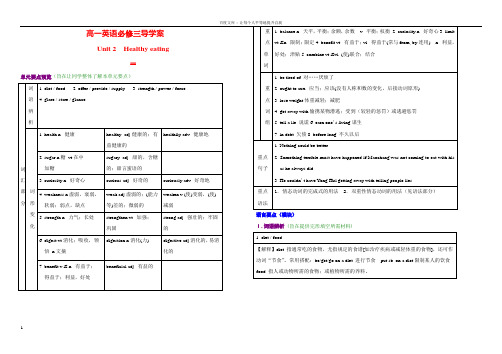
Ⅲ.重点词汇(旨在提供词汇综合运用材料)1. balance n. 天平,平衡;余额,余数v. 平衡;权衡balanced adj. 均衡的[典例] 1). Try to achieve a better balance between work and play. 争取把工作和娱乐更好地结合起来。
2). I must check my bank balance (= find out how much money I have in my account).我要核对一下我在银行的余额(看我的帐户上有多少钱)。
3). Try to balance your diet by eating more fruit and less protein. 多吃些水果, 少摄入些蛋白质, 使饮食均衡合理。
[重点用法] a balanced diet 均衡的饮食keep the balance of nature保持生态平衡keep one’ s balance保持平衡lose one’ s balance (= be out of balance) 失去平衡[练习] 用balance短语填空或翻译。
1). He ______ ______ ______ and hurt himself when he went upstairs.2). It is difficult to for you to ______ ______ _______ on an icy pavement.3). 我们必须权衡利弊才做出决定。
____________________________________2. curiosity n. 好奇心curious adj. 好奇的curiously adv. 好奇地[典例] 1). Children have a natural curiosity about the world around them.小孩子对他们周围的世界有着天生的好奇心。
新目标人教版英语高一必修3unit1reading部分教案
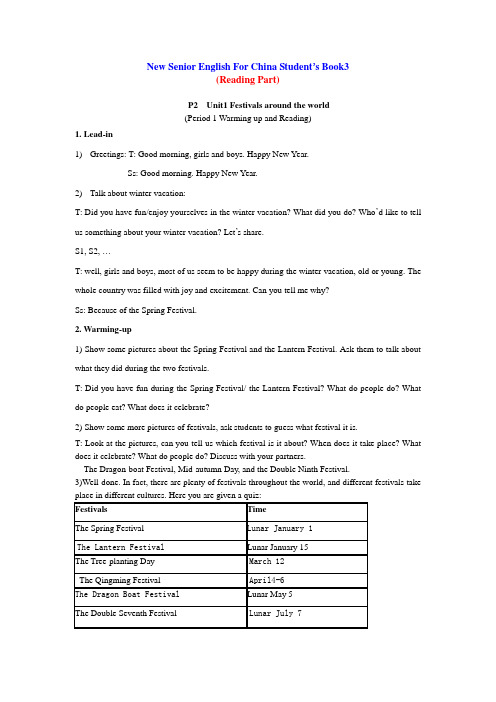
New Senior English For China Student’s Book3(Reading Part)P2 Unit1 Festivals around the world(Period 1 Warming up and Reading)1. Lead-in1)Greetings: T: Good morning, girls and boys. Happy New Year.Ss: Good morning. Happy New Year.2)Talk about winter vacation:T: Did you have fun/enjoy yourselves in the winter vacation? What did you do? Who’d like to tell us something about your winter vacation? Let’s share.S1, S2, …T: well, girls and boys, most of us seem to be happy during the winter vacation, old or young. The whole country was filled with joy and excitement. Can you tell me why?Ss: Because of the Spring Festival.2. Warming-up1) Show some pictures about the Spring Festival and the Lantern Festival. Ask them to talk about what they did during the two festivals.T: Did you have fun during the Spring Festival/ the Lantern Festival? What do people do? What do people eat? What does it celebrate?2) Show some more pictures of festivals, ask students to guess what festival it is.T: Look at the pictures, can you tell us which festival is it about? When does it take place? What does it celebrate? What do people do? Discuss with your partners.The Dragon-boat Festival, Mid-autumn Day, and the Double Ninth Festival.3)Well-done. In fact, there are plenty of festivals throughout the world, and different festivals takeTeachers ’ Day September 10 The Double Ninth Festival Lunar September 9 The National Day October 1 Festivals Time New Year’s Day January 1 Valentine ’s Day February 14 Fool’s Day April1 Labour ’s Day May 1 Children’s Day June 1 Halloween October 31Thanksgiving Day The four Thursday in November Christmas DayDecember 253. Reading 1) Fast readingT: Got it. You seem to know many festivals. But do you know how these festivals began? What do people do to celebrate? Luckily, the passage provides you much information. Read the passage quickly and find out the festivals mentioned here:What festivals are mentioned in the text?FestivalsObonThe Day of the DeadHalloweenThe DragonBoat Festival Columbus DayNational Festival in IndiaMid-autumn FestivalsEasterThe Cherry Blossom FestivalCarnivals2) Now, let ’s get to know more about these festivals, listen to the tape and find out the information accordingly to fill in the form or answer the questions: Paragraph 1:When did ancient people celebrate ?• at the end of winter• When good weather returned • a good harvest • animals caught•When they wanted a year of plenty*When do people celebrate now?When they welcome a new yearWhen families get togetherWhen they achieve great successWhen something pleasant happens…The Qingming Festival…Any other festivals which are meant to honour people in China? Who is honoured?Tree-planting Day ; Sun Yet-sun.…Paragraph 4:Harvest Festivals1) Why are autumn festivals happy events?Because people are grateful and happy and a season of agricultural work is over.2) What do people do to celebrate it?In European countries, it is the custom to decorate churches and town halls with flowers and fruit; get together to have meals, win awards for their animals, flowers, fruit and vegetables; admire the moon…Paragraph 6: What are the purposes of festivals?Festivals: To have fun with each other / To let us enjoy life/ To be proud of our customs/ To forget our daily life for a little while/To honour the dead/To honour famous people/To celebrate harvest/To welcome a new year and look forward to the future/To ask people to pay attention to something3)Well-done. Since you have got to know the information related to these festivals, I’d like youto have a quiz to check whether you have fully understood the text. Look at the statements and tell whether they are true or false.4. Homework1)Find out useful words and expressions, beautiful sentences and finish the exercises inLearning about Language accordingly.2)Write an introduction of the festival your group have created.。
高中英语(新教材)人教版选择性必修第三册学案:Unit1 Reading and Thinking (含解析)
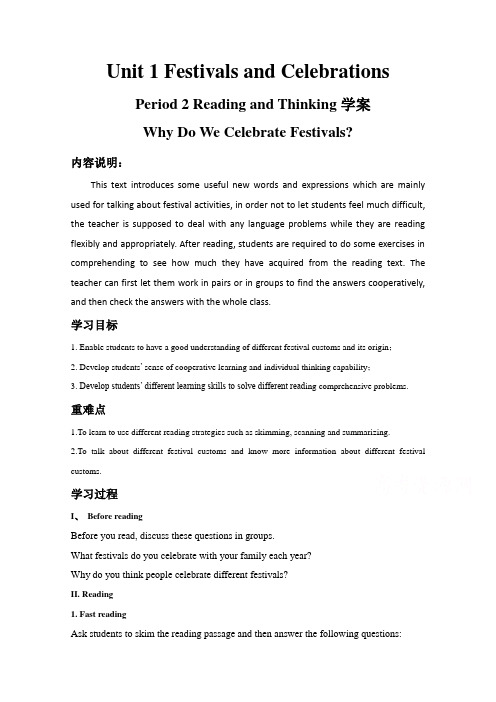
Unit 1 Festivals and CelebrationsPeriod 2 Reading and Thinking学案Why Do We Celebrate Festivals?内容说明:This text introduces some useful new words and expressions which are mainly used for talking about festival activities, in order not to let students feel much difficult, the teacher is supposed to deal with any language problems while they are reading flexibly and appropriately. After reading, students are required to do some exercises in comprehending to see how much they have acquired from the reading text. The teacher can first let them work in pairs or in groups to find the answers cooperatively, and then check the answers with the whole class.学习目标1. Enable students to have a good understanding of different festival customs and its origin;2. Develop students’ sense of cooperative learning and individual thinking capability;3. Develop students’ different learning skills to solve different read ing comprehensive problems.重难点1.To learn to use different reading strategies such as skimming, scanning and summarizing.2.To talk about different festival customs and know more information about different festival customs.学习过程I、Before readingBefore you read, discuss these questions in groups.What festivals do you celebrate with your family each year?Why do you think people celebrate different festivals?II. Reading1. Fast readingAsk students to skim the reading passage and then answer the following questions:People all over the world celebrate different festivals because:They would like toFestivals2、In pairs, discuss the following questions.(1)What do most festivals seem to have in common? Why do you think people around the world find these things important?(2)How do you feel about festival customs that have already faded away?(3)What is the writ er’s attitude towards the commercialization of festivals?III、Read the text again and underline the topic sentence of each paragraph that gives the main idea.Discuss the change about the festival custom. Student discuss related questions on some festivals and traditional customs’ gradual exit from modern life by groups of four, and complete the following table.VI、Analyze the structure of the text and some difficult sentences, and review some important words and sentences. Students complete the gap filling of the text independently. Be sure to use the correct formsVI、HomeworkWrite an article about the festival or celebration based on your notes above.。
新目标人教版英语高一必修3unit1reading部分教案
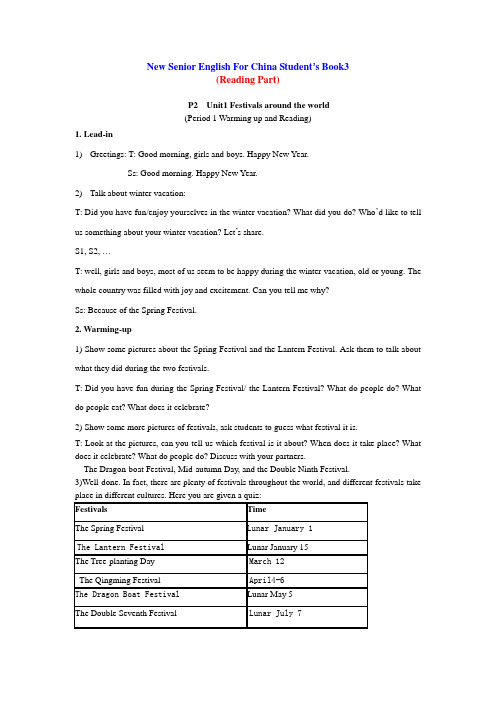
New Senior English For China Student’s Book3(Reading Part)P2 Unit1 Festivals around the world(Period 1 Warming up and Reading)1. Lead-in1)Greetings: T: Good morning, girls and boys. Happy New Year.Ss: Good morning. Happy New Year.2)Talk about winter vacation:T: Did you have fun/enjoy yourselves in the winter vacation? What did you do? Who’d like to tell us something about your winter vacation? Let’s share.S1, S2, …T: well, girls and boys, most of us seem to be happy during the winter vacation, old or young. The whole country was filled with joy and excitement. Can you tell me why?Ss: Because of the Spring Festival.2. Warming-up1) Show some pictures about the Spring Festival and the Lantern Festival. Ask them to talk about what they did during the two festivals.T: Did you have fun during the Spring Festival/ the Lantern Festival? What do people do? What do people eat? What does it celebrate?2) Show some more pictures of festivals, ask students to guess what festival it is.T: Look at the pictures, can you tell us which festival is it about? When does it take place? What does it celebrate? What do people do? Discuss with your partners.The Dragon-boat Festival, Mid-autumn Day, and the Double Ninth Festival.3)Well-done. In fact, there are plenty of festivals throughout the world, and different festivals takeTeachers ’ Day September 10 The Double Ninth Festival Lunar September 9 The National Day October 1 Festivals Time New Year’s Day January 1 Valentine ’s Day February 14 Fool’s Day April1 Labour ’s Day May 1 Children’s Day June 1 Halloween October 31Thanksgiving Day The four Thursday in November Christmas DayDecember 253. Reading 1) Fast readingT: Got it. You seem to know many festivals. But do you know how these festivals began? What do people do to celebrate? Luckily, the passage provides you much information. Read the passage quickly and find out the festivals mentioned here:What festivals are mentioned in the text?FestivalsObonThe Day of the DeadHalloweenThe DragonBoat Festival Columbus DayNational Festival in IndiaMid-autumn FestivalsEasterThe Cherry Blossom FestivalCarnivals2) Now, let ’s get to know more about these festivals, listen to the tape and find out the information accordingly to fill in the form or answer the questions: Paragraph 1:When did ancient people celebrate ?• at the end of winter• When good weather returned • a good harvest • animals caught•When they wanted a year of plenty*When do people celebrate now?When they welcome a new yearWhen families get togetherWhen they achieve great successWhen something pleasant happens…*Are there any similar festivals in China? What do do? What to eat?The Qingming Festival…Any other festivals which are meant to honour people in China? Who is honoured?Tree-planting Day ; Sun Yet-sun.…Paragraph 4:Harvest Festivals1) Why are autumn festivals happy events?Because people are grateful and happy and a season of agricultural work is over.2) What do people do to celebrate it?In European countries, it is the custom to decorate churches and town halls with flowers and fruit; get together to have meals, win awards for their animals, flowers, fruit and vegetables; admire the moon…Paragraph 6: What are the purposes of festivals?Festivals: To have fun with each other / To let us enjoy life/ To be proud of our customs/ To forget our daily life for a little while/To honour the dead/To honour famous people/To celebrate harvest/To welcome a new year and look forward to the future/To ask people to pay attention to something3)Well-done. Since you have got to know the information related to these festivals, I’d like youto have a quiz to check whether you have fully understood the text. Look at the statements and tell whether they are true or false.4. Homework1)Find out useful words and expressions, beautiful sentences and finish the exercises inLearning about Language accordingly.2)Write an introduction of the festival your group have created.。
高中英语 人教版必修三unit1复习导学案与答案
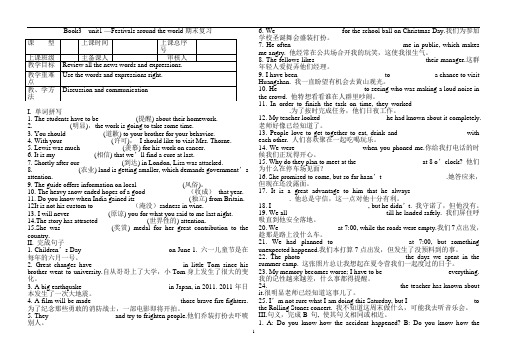
Book3 unit1 —Festivals around the world期末复习I. 单词拼写1. The students have to be __________ (提醒) about their homework.2. __________ (明显),the work is going to take some time.3. You should __________ (道歉) to your brother for your behavior.4. With your______________ (许可),I should like to visit Mrs. Thorne.5. Lewis was much ____________(羡慕) for his work on cancer.6. It is my ___________(相信) that we’ll find a cure at last.7. Shortly after our ____________(到达) in London, Lisa was attacked.8. _____________(农业) land is getting smaller, which demands government’s attention.9. The guide offers information on local _____________(风俗)。
10. The heavy snow ended hopes of a good ___________ (收成)that year.11. Do you know when India gained its _______________ (独立) from Britain. 12It is not his custom to ___________(淹没)sadness in wine.13. I will never ___________(原谅) you for what you said to me last night.14.The story has attracted ______________(世界性的) attention.15.She was ______________(奖赏) medal for her great contribution to the country.II. 完成句子1. Children’s Day ____________ ____________ on June 1. 六一儿童节是在每年的六月一号。
人教版必修三unit1期末复习能力提升和答案

Book3 unit1—Festivals around the world期末复习能力提升单词拼写1.The captain ordered their soldiers to (聚集) on the deck.2.It is no use trying to (沉浸) your sorrows in drink.3.The management have (奖励) all factory employees a 5% pay increase. 4.You have to (钦佩) the way he handled the situation.5.It is the (风俗) in that country for women to marry young.6.It was (显然) to everyone that the child had been badly treated.7.(原谅) me for interrupting, but I really don't agree with that.8.A student should always (提醒) himself not to be late for class.9.You'd better to Mary for having kept her waiting for hours outside.10. It is surprising that there are still many people many who die of in the world.单句语法填空1.This reminds me ________ what we did together during our holiday.2.As Christmas Day is coming,the Smiths _____________(beauty) their house now so that festival atmosphere can accompany them.3.It is_______________(believe) that a sevenyearold boy can speak 10 foreign languages. 4.There is no doubt that he can solve the problem ________________(independence).5.It is my________(believe) that God helps those who help themselves.6.Mr Li treated us students as if we________(be) his own children.7.Einstein________________(award) the Nobel Prize for his great contributions to science.8._______________________ travel can broaden your mind,I don’t think it’s a good idea to spend too much time and money on it.9.________(remind) not to miss the flight at 15:20;the manager set out for the airport in a hurry.10.We’re looking forward to________(see) the new policy cared out,which has drawn many people’s attention.完成句子1.The Spring Festival is one of the most important traditional festivals in China,which always ______________ (让我们想到) the family reunion.2.During the Spring Festival,people ____________ (盛装打扮) to take part in a variety of activities.3.They give children lucky money and ________________ (盼望) the wonderful future. 4.__________________ (遗憾的是) some people can’t participate in the celebration of such a great festival for a variety of reasons.5.During the Spring Festival,people can express appreciation,________________(道歉) or forgive each other.6.__________________________________ (尽管因特网对我们有很大的帮助),I don’t think it is a good idea to spend too much time on it.7.While______________________________,I heard someone calling my name.正当我在观赏那座新建筑时,我听到有人叫我的名字。
高一英语必修三workbook unit1答案

高一英语必修三workbook unit1答案1、Kids will soon get tired of learning _____ more than they can. [单选题] *A. if they expect to learnB. if they are expected to learn(正确答案)C. if they learn to expectD. if they are learned to expect2、Tom will _______ me a gift from Japan. [单选题] *A. takeB. getC. carryD. bring(正确答案)3、Before you quit your job, ()how your family will feel about your decision. [单选题] *A. consider(正确答案)B. consideringC. to considerD. considered4、Three ______ died of water pollution last winter. [单选题] *A. hundreds of villagersB. hundred villagers(正确答案)C. hundreds villagersD. hundred of villagers5、The market economy is quickly changing people’s idea on_____is accepted. [单选题] *A.what(正确答案)B.whichC.howD.that6、73.()about the man wearing sunglasses during night that he was determined to follow him.[单选题] *A. So curious the detective wasB.So curious was the detective(正确答案)C.How curious was the detectiveD.How curious the detective was7、Marie is a _______ girl.She always smiles and says hello to others. [单选题] *A. shyB. friendly(正确答案)C. healthyD. crazy8、The man lost his camera and he ______ it now.()[单选题] *A. foundB. is findingC. is looking forD. looks for(正确答案)9、Though my best friend Jack doesn’t get()education, he is knowledgeable. [单选题] *A. ManyB. littleC. fewD. much(正确答案)10、The beautiful radio _______ me 30 dollars. [单选题] *A. spentB. paidC. cost(正确答案)D. took11、At last the plane landed at the Beijing Airport safely. [单选题] *A. 平稳地B. 安全地(正确答案)C. 紧急地D. 缓缓地12、15.This kind of bread is terrible. I do not want to eat it ________. [单选题] *A.any more(正确答案)B.some moreC.no longerD.some longer13、I've never been to Africa, but that is the place(). [单选题] *A. where I most want to visitB. in which I most want to visitC. I most want to visit(正确答案)D. that I want to visit it most14、For the whole period of two months, there _____ no rain in this area. Now the crops aredead [单选题] *A. isB. wasC. has been(正确答案)D. have been15、Tom is very _______. He never cleans his room. [单选题] *A. lazy(正确答案)B. activeC. shyD. healthy16、( ) What _____ fine weather we have these days! [单选题] *A. aB. theC. /(正确答案)D. an17、I always get ______ grades than he does, so maybe I should help him more.()[单选题] *A. bestB. better(正确答案)C. goodD. well18、The reason I didn't attend the lecture was simply _____ I got a bad cold that day. [单选题] *A. becauseB. asC. that(正确答案)D. for19、-----How can I apply for an online course?------Just fill out this form and we _____ what we can do for you. [单选题] *A. seeB. are seeingC. have seenD. will see(正确答案)20、( ) It ___ the Chinese people 8 years to build the Dam. [单选题] *A. took(正确答案)B. costsC. paidD. spends21、All he _______ was a coat. [单选题] *A. had on(正确答案)B. had toC. had a restD. had a good time22、Whatever difficulties you have, you should not _______ your hope. [单选题] *A. give inB. give outC. give up(正确答案)D. give back23、He was proud of what he had done. [单选题] *A. 对…感到自豪(正确答案)B. 对…感到满足C. 对…表示不满D. 对…表示后悔24、In fact, Beethoven did something brave than dying. [单选题] *A. 勇敢(正确答案)B. 冒险C. 可怕D. 奇妙25、We should have breakfast every day to keep ______. [单选题] *A. healthB. healthy(正确答案)C. healthilyD. the healthy26、89.The blackboard is ________ the classroom. [单选题] * A.nextB.betweenC.in front ofD.in the front of(正确答案)27、48.—________ is your new skirt, Lingling?—Black. [单选题] * A.HowB.What colour(正确答案)C.WhichD.Why28、_____from far away, the 600-meter tower is stretching into the sky. [单选题] *A. SeeB. SeeingC. To seeD. Seen(正确答案)29、Our teacher was very happy because _______ failed the exam. [单选题] *A. somebodyB. anybodyC. nobody(正确答案)D. everybody30、You can ask()is on duty there tonight. [单选题] *A. WhatB. whomC. whoever(正确答案)D. whomever。
高一英语必修3第三单元导学案
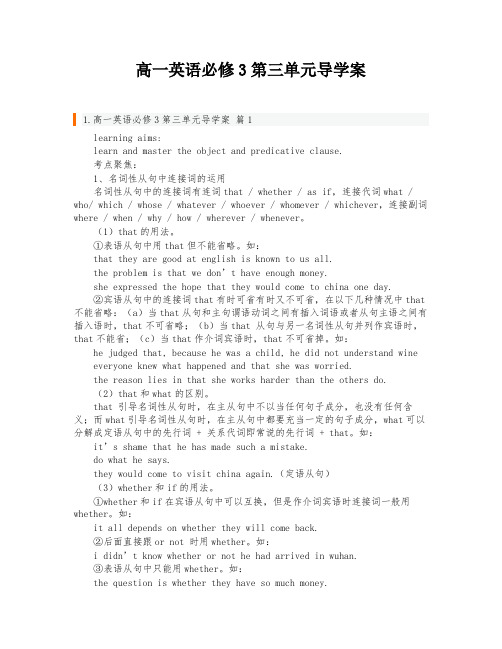
高一英语必修3第三单元导学案1.高一英语必修3第三单元导学案篇1learning aims:learn and master the object and predicative clause.考点聚焦:1、名词性从句中连接词的运用名词性从句中的连接词有连词that / whether / as if,连接代词what / who/ which / whose / whatever / whoever / whomever / whichever,连接副词where / when / why / how / wherever / whenever。
(1)that的用法。
①表语从句中用that但不能省略。
如:that they are good at english is known to us all.the problem is that we don’t have enough money.she expressed the hope that they would come to china one day.②宾语从句中的连接词that有时可省有时又不可省,在以下几种情况中that 不能省略:(a)当that从句和主句谓语动词之间有插入词语或者从句主语之间有插入语时,that不可省略;(b)当that 从句与另一名词性从句并列作宾语时,that不能省;(c)当that作介词宾语时,that不可省掉。
如:he judged that, because he was a child, he did not understand wine everyone knew what happened and that she was worried.the reason lies in that she works harder than the others do.(2)that和what的区别。
that 引导名词性从句时,在主从句中不以当任何句子成分,也没有任何含义;而what引导名词性从句时,在主从句中都要充当一定的句子成分,what可以分解成定语从句中的先行词 + 关系代词即常说的先行词 + that。
人教版高中英语必修第3册 Unit 1 Reading for Writing导学案

3.学习准备:
准备好必修三课本和笔记本。
4.学习方式和环节:
按老师指令完成相应的课上练习,学习环节主要有:
了解学习目标,进入文本阅读。第一遍阅读,回答两个概括性பைடு நூலகம்问题 第二遍阅读回答两个开放性问题 第三遍阅读,分析文章的结构和语言特点应用三种句型改写句子 根据表格梳理自己文章的内容和结构,进而进行写作练习 根据评价表自行修改自己的文章 阅读例文,借鉴其中好的内容和语言,再次修改自己的文章
导学案
1.课题名称:
人教版高一必修三英语——Unit1 Reading for writing
2.学习目标:
In this class, you will:
1. Acquire the information about Naadam Festival
2. Analyze the organization and language features of the diary
- 1、下载文档前请自行甄别文档内容的完整性,平台不提供额外的编辑、内容补充、找答案等附加服务。
- 2、"仅部分预览"的文档,不可在线预览部分如存在完整性等问题,可反馈申请退款(可完整预览的文档不适用该条件!)。
- 3、如文档侵犯您的权益,请联系客服反馈,我们会尽快为您处理(人工客服工作时间:9:00-18:30)。
英语期末复习Book 3 Unit1 Festivals around the world基础知识按要求写出下列单词1.收获,收割n.& v._______________ 2.祖先,祖宗n_______________________3.起源,由来,起因n.origin___________ 4.诡计,恶作剧;欺骗n.& v.________5.获得,得到v.______________________ 6.信任,信心,信仰n.____________________ 7.农业的,农艺的adj.________________ 8.奖品;授予n.& v._____________________ 9.许可,允许n.______________________10.明显的,显而易见的adj.________________ 11.独立n.___________________________独立的adj.________________________________ 依靠v.___________________________可依靠的adj._______________________________ 12.赞美v._________________________ 羡慕n.______________________________________ 13.精力充沛的adj.__________________ 精力n.______________________________________ 14.道歉v.__________________________道歉n.______________________________________ 15.悲哀n._____________悲哀的adj.______________悲哀地adv.______________________短语:1. 庆祝寒冬的结束、春耕以及秋收________________________________________2. 纪念死者及满足祖先________________________________________3. 扫墓、烧香以缅怀祖先________________________________________4. 吃制成颅骨形状的食物和装点有“骨头”的蛋__________________________________5. 向亡者祭献食物、鲜花和礼品________________________________________6. 帮助印度脱离英国获得独立________________________________________7. 用花果来装饰教堂和市政厅________________________________________8. 因为他们的农产品而获奖________________________________________9. 赏月________10. 期待冬天的结束和春天的降临_____________________11. 给孩子们送红纸包着的压岁钱________________________________________12. 在街头昼夜跳舞________________________________________13. 庆祝耶稣复活________________________________________14. 看上去像覆盖了一层粉红色的雪________________________________________15. 喜欢聚在一起吃、喝、玩耍________________________________________16. 用咖啡来解愁________________________________________17. 在人间遇到牛郎________________________________________18. 每年跨过银河相会一次________________________________________19. 阴历七月初七________________________________________20. 动身回家____________21. 零下32度_________________22. 沿着街道堆积(堆满街头)________________________________________23. 成百上千的人们_______________24. 参加为时一周的冬季节日________________25. 在俯视河流的山上观看滑雪比赛________________________________________26. 拉着雪橇高速越过雪道________________________________________27. 欣赏冰雕________________28. 随着乐队的音乐起舞_______________29. 穿着厚厚的衣服_____________30. 睡懒觉______________________ 重点句式1. At that time people would starve if food _______ ____________ _______ _______ (难以找到), especially during the cold winter months.2. It is now a children’s festival, __________ they can dress up and go to their neighbors’ home to ask for sweets. 万圣节前夕如今成了孩子们的节日,这天他们可以乔装打扮去邻居家要糖果吃。
3. The country, covered with cherry tree flowers, looks ______ __________ it is covered with pink snow. 整个过度到处是盛开的樱花,看上去就像覆盖了一层粉红色的雪。
4. ______ _______ _________ _______ the manager of the coffee shop was waiting for Li Fang to leave.很明显,咖啡馆里的经理在等李方离开。
语法项目:情态动词的基本用法1. _____it be true? 这可能是真的吗?2. I believe that he _______ be so rude.我相信他不会如此粗鲁。
3. __________ you succeed! 祝你成功!4. On Sunday he ________________ go to the park to play chess.以前\\现在每到星期天他总是到公园去下棋。
5. When __________ he be able to leave the hospital?他什么时候能离开医院?6. You __________ fail if you don’t work hard.如果你不努力学习你会考试不及格。
7. He __________ be anxious to know the results.他一定很想知道结果。
8. Why __________ it rain on Sunday?为什么偏偏在星期天下雨?课文填空Festivals and celebrations of all kinds 1__________(hold) everywhere since ancient times. Some celebrations would be held after hunters 2__________(catch) animals. At that time people would starve if food was difficult to find, 3________(especial) during the cold winter months. Some festivals are held to honour the dead or to satisfy the ancestors, 4______ might return either to help 5_____ to do harm. For the Japanese festival Obon, people should go to clean graves and light incense 6_______ memory of their ancestors. In Mexico, people celebrate the Day of the Dead 7_____ early November. 8_____ this important feast day, peopl e eat food in the shape of skulls and cakes with “bones” on them.There are festivals to honour people. India has a national festival to honour Mohandas Gandhi, the leader who helped gain India’s independence 9_____ Britain.Harvest and Thanksgiving festivals can be very happy events. People are grateful 10____ their food is gathered and the 11__________(agriculture) work is over. People usually decorate churches and town halls 12_____ flowers and fruit. China and Japan have mid-autumn festivals, 13_____ people admire the moon. The most 14__________(energy) and important festivals are the ones15 _____ look forward to the end of winter and to the coming of spring. 16______ the Spring Festival in China, people eat dumplings, fish and meat and may give children luck money. Some Western countries have very exciting carnivals, 17_____ take place forty days before Easter. Easter is an important 18__________(religion) and social festivals for Christians around the world. Japan’s Cherry Blossom Festival happens a lit tle later. The country, 19__________(cover) with cherry tree flowers, looks as though it is covered _20_____ pink snow.英语期末复习Book3 Unit1 Festivals around the world 答案基础知识:按要求写出下列单词1.收获,收割n.& v.harvest2.祖先,祖宗n.ancestor3.起源,由来,起因n.origin4.诡计,恶作剧;欺骗n.& v.trick5.获得,得到v.gain6.信任,信心,信仰n.belief7.农业的,农艺的adj.agricultural8.奖品;授予n.& v.award9.许可,允许n.permission10.明显的,显而易见的adj.obvious11.独立n.independence独立的adj.independent依靠v.depend可依靠的adj.dependable12.赞美v.admire羡慕n.admiration13.精力充沛的adj.energetic精力n.energy14.道歉v.apologize道歉n.apology15.悲哀n.sadness悲哀的adj.sad悲哀地adv.sadly短语.1. celebrate the end of cold winter/weather, planting in spring and harvest in autumn2. honour the dead and satisfy the ancestors3. clean graves and light incense in memory of their ancestors4. eat food in the shape of skulls and cakes with “bone” on them5. offer food, flowers and gifts to the dead6. help gain India’s independence from Britain7. decorate churches and town halls with flowers and fruit8. win awards for their farm produce9. admire the moon10. look forward to the end of winter and to the coming of spring 11. give children lucky money in red paper12. dance in the streets day and night13. celebrate the return of Jesus from the dead14. look as though it is covered with pick snow15. love to get together to eat, drink and have fun with each other16. drown one’s sadness in coffee17. meet the herd boy Niulang on earth18. cross the Milky River to meet once a year19. on the seventh day of the seventh lunar month20. set off for home21. 32 degrees below freezing/zero 22. pile up along the sidewalks23. hundreds of thousands of people 24. take part in the week-long winter festival25. watch the snowboarding competitions on the hill overlooking the river26. pull sleds at great speeds along a snowy track 27.admire ice sculptures28. dance to the music of a band 29. be dressed in heavy clothes 30. sleep in重点句式1.was difficult to find2.when3. As if4. It is obvious that语法项目:1. Can2. can’t3. May4. would \\ will5. shall6. shall7. must8. must课文填空1. have been held2.had caught3. especially4.who5.or6.in7.in8.On9.from 10.because 11.agricultural 12.with 13.when 14.energetic 15.that 16.At 17.which 18.religious 19.covered 20 . with。
